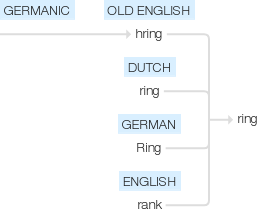Ring
Old English hring, of Germanic origin; related to Dutch ring, German Ring, also to the noun rank1.
wiktionary
From Middle English ring, from Old English hring(“ring, circle”), from Proto-Germanic *hringaz(“ring”), from Proto-Indo-European *(s)krengʰ-, extended nasalized form of *(s)ker-(“to turn, bend”). Cognate with West Frisian ring, Low German Ring, Dutch ring, German Ring, Swedish ring, also Finnish rengas. Doublet of rink.
From Middle English ringen, from Old English hrinġan(“to ring”), from Proto-Germanic *hringijaną. Cognate with Dutch ringen, Swedish ringa.
From a shortening of German Zahlring(“number(s) ring”) (coined by German mathematician David Hilbert in 1892). [1] Apparently first used in English in 1930, E. T. Bell, “Rings whose elements are ideals,” Bulletin of the American Mathematical Society. [2]
(This etymology is missing or incomplete. Please add to it, or discuss it at the Etymology scriptorium.)
etymonline
ring (n.1)
[circular band] Old English hring "circlet of metal, especially one of a precious metal for wearing on the finger ornamentally, also a part of a mail coat; anything circular," from Proto-Germanic *hringaz "something curved, circle" (source also of Old Norse hringr, Old Frisian hring, Danish, Swedish, Dutch ring, Old High German hring, German Ring), from nasalized form of PIE root *sker- (2) "to turn, bend."
Other Old English senses were "circular group of persons" (birds, actually), also "horizon." In Old and Middle English also "a bracelet, armlet." As a token of marriage, betrothal, chastity, etc., by c. 1200. The sense of "a number of things arranged in a circle" is by 1580s.
The meaning "place for prize fight and wrestling bouts" (early 14c.) is from the space in a circle of bystanders in the midst of which such contests once were held, "... a circle formed for boxers, wrestlers, and cudgel players, by a man styled Vinegar; who, with his hat before his eyes, goes round the circle, striking at random with his whip to prevent the populace from crowding in" [Grose, 1785]. Hence the ring "boxing" (by 1770). The meaning "combination of persons interested in attaining some object" is from 1829, originally commercial or political, latter in reference to espionage or terrorism. Of the annual growth bands in trees, from 1670s.
Fairy ring is from 1620s. Ring finger, "third finger of the left hand" (in anatomy, of either hand) is Old English hringfingr, a compound also attested in other Germanic languages; it is also called ring-man (15c.). To run rings round (someone) "be superior to" is from 1891.
The nursery rhyme ring a ring a rosie is attested in an American form (with a different ending) from c. 1790. "The belief that the rhyme originated with the Great Plague is now almost universal, but has no evidence to support it and is almost certainly nonsense" ["Oxford Dictionary of English Folklore"]. This proposal of connection dates only to the late 1960s.
ring (v.1)
[sound a bell; emit a resonant sound] Old English hringan "cause (a bell) to sound;" also "announce or celebrate by the ringing of bells," from Proto-Germanic *khrengan (source also of Old Norse hringja, Swedish ringa, Middle Dutch ringen), probably of imitative origin. Related: Rang; rung.
Originally a weak verb, the strong inflection began in early Middle English by influence of sing, etc. The intransitive sense of "give a certain resonant sound when struck" is by c. 1200. Of places, "resound, re-echo," c. 1300. Of the ears or head, "have a continued buzz or hum in reaction to exposure to noise," by late 14c. In reference to a telephone, intransitive, by 1924; as "to call (someone) on a telephone by 1880, with up (adv.). The verb was much used in phrases of 20c. telephoning, such as ring off "hang up," ring back "return a call," ring in "report by telephone."
To ring down (or up) a theatrical curtain, "direct it to be let down" (or up) is by 1772, from the custom of signaling for it by ringing a bell; hence, in a general sense "bring to a conclusion." To ring up a purchase on a cash register is by 1937, from the bell that sounds in the machine. The specialized sense, especially in reference to coins, "give a resonant sound when struck as an indication of genuineness or purity," is by c. 1600, with transferred use (as in ring hollow) by 1610s. For ring a bell "awaken a memory," see bell (n.).
ring (v.2)
"put a ring on" (late 14c.); "make a circle around" (c. 1500); from ring (n.1) and probably in part from Old English ymbhringan "surround, encircle," from the root of ring (n.1). Related: Ringed; ringing. Compare Frisian ringje, Middle Dutch and Dutch ringen, Old High German ringan, German ringen, Old Norse hringa, hringja.
The intransitive sense of "gather in a ring" is attested by mid-15c. The sense of "provide or attach a ring or rings, affix a ring to" is from late 14c.; that of "adorn with rings" is from 1550s. The meaning "move in a circle around" is from 1825. The meaning "cut out a ring of bark from (a tree) to obstruct the flow of sap" is by 1800. It also meant "put a ring in the nose of (swine, cattle) to keep them from rooting or violence" (1510s), and this was used figuratively in 17c.-18c.
I apprehend also, that the wife, when she found she was to be rung, very wisely made a virtue of necessity, and added jewels to the ring .... ["Adam Fitz-Adam," "The World," Edinburgh, 1776]
ring (n.2)
1540s, "set of church bells," from ring (v.1). The meaning "a call on the telephone" is from 1900; to give (someone) a ring (up) "call on the telephone" was in use by 1910. Meaning "a ringing sound, the sound of a bell or other sonorous body" is from 1620s; specifically "the ringing sound made by a telephone" by 1951. The meaning "resonance of coin or glass as a test of genuineness" is from 1850, hence transferred use (ring of truth, etc.).
